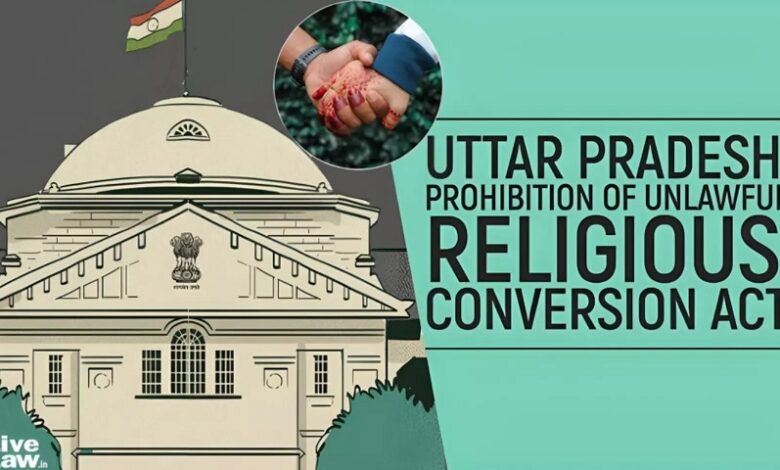Allahabad High Court Warns Against Unlawful Religious Conversions

News Mania Desk/ Agnibeena Ghosh/ 3rd July 2024
The Allahabad High Court has issued a stern warning regarding the consequences of continued unlawful religious conversions, stating that if such activities persist, the majority population in India could become a minority. These observations were made while the court was hearing a case involving the unlawful conversion of religion in Hamirpur district, Uttar Pradesh.
The case involved serious allegations against an individual named Kailash, who was accused of taking villagers from Hamirpur to a so-called “well-being” gathering in Delhi for the purpose of converting them to Christianity. Justice Rohit Ranjan Agarwal, citing these allegations, denied bail to Kashish under the Uttar Pradesh Prohibition of Unlawful Conversion of Religion Act, 2021, as reported by Bar and Bench.
The court noted the gravity of the accusations, which involved the informant’s brother being taken to Delhi and converted to Christianity, after which he never returned. The informant, along with several others, alleged that Kailash had promised mental health treatment for her brother, but he did not fulfill this promise. When questioned, Kailash failed to provide a satisfactory explanation, leading the informant to approach the police.
In its remarks, the court emphasized the potential demographic impact of allowing such conversion activities to continue unchecked. It asserted that religious gatherings aimed at converting individuals should be stopped immediately to prevent the alteration of the religious makeup of the country.
The court also highlighted the frequent occurrence of such unlawful conversions in Uttar Pradesh, particularly among people from SC/ST castes and economically disadvantaged groups. These observations were based on multiple cases brought to the court’s attention, revealing a widespread issue across the state.
Article 25 of the Indian Constitution, which guarantees “freedom of conscience and free profession, practice, and propagation of religion,” was referenced by the court. However, the court clarified that this freedom does not extend to converting individuals from one faith to another. The term “propagation” is intended to mean the promotion of a religion, not the conversion of individuals from one faith to another.
The First Information Report (FIR) filed at Maudaha police station in Hamirpur district in 2023 detailed the incident where Ramphal, the informant’s brother, was taken to Delhi by Kailash along with other villagers. The report stated that these individuals were converted to Christianity during the gathering.
The court’s decision to deny bail to Kashish underscores the seriousness with which it views the issue of unlawful religious conversions. The ruling is a clear message that such activities will not be tolerated and that those found engaging in or facilitating such conversions will face legal consequences.
This case sheds light on the broader issue of religious conversions in India and the legal and societal implications they carry. The Allahabad High Court’s observations and ruling aim to protect the religious demographics of the country and ensure that conversions are not carried out under false pretenses or coercion. As the legal proceedings continue, the case will likely prompt further discussions on religious freedom, legal protections, and the ethical boundaries of religious propagation in India.






